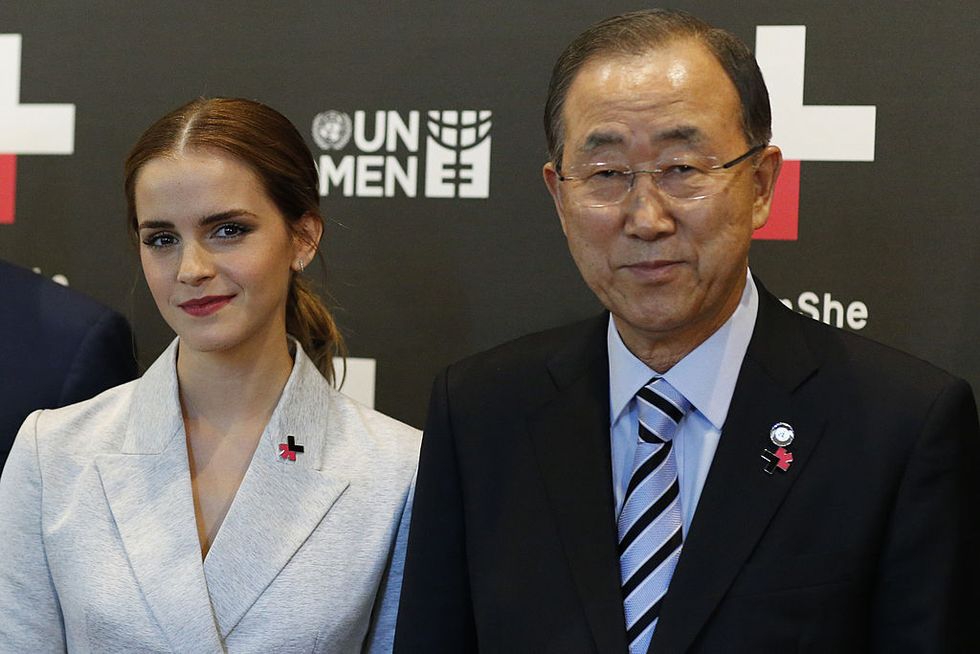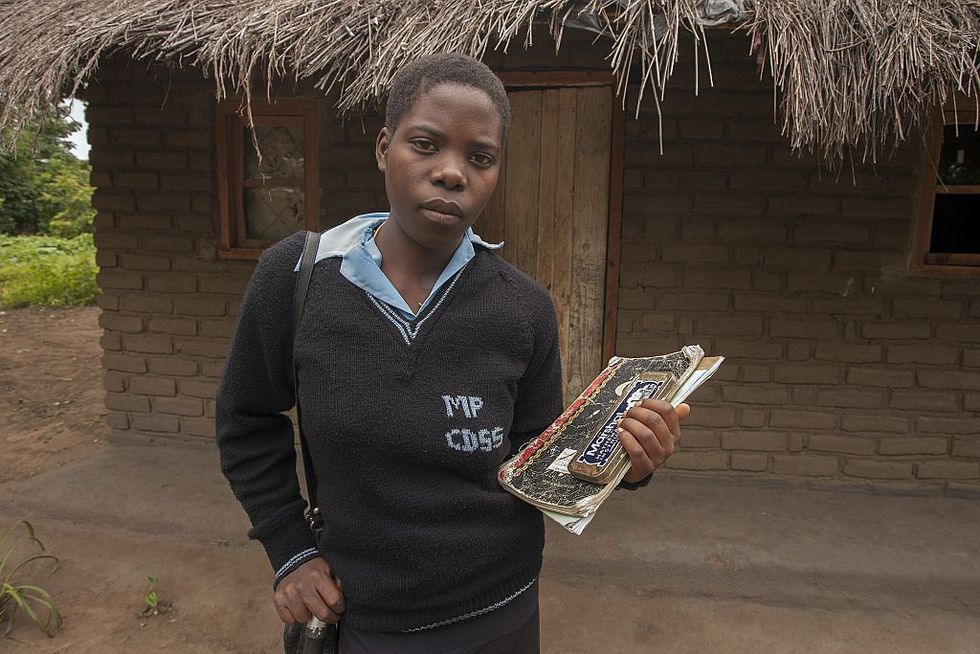It's been three years since Emma Watson introduced the UN Women initiative: HeForShe, with an impassioned, groundbreaking and viral speech.
The Harry Potter actress established herself as a formidable force of 21st century feminism, when she used her platform to call on men to help in the fight for gender equality.
Three years later, HeForShe is presenting its annual IMPACT 10x10x10 report on gender parity at New York's UN headquarters, with 30 global leaders in attendance.
The latest report draws on the experience, advice and successes from male leaders across three different sectors: the public sector (governments), private sector (big businesses and companies) and academia.
'HeForShe was founded with the simple premise that you can't solve whole-of-society challenges with only half of society. At the same time, cracking the glass ceiling and achieving real equality shouldn't be something women have to do alone,' Elizabeth Nyamayaro, head of the HeForShe initiative, told ELLE.
'That's what the IMPACT 10x10x10 initiative is all about – 30 male leaders – Heads of State, global CEOs, and University Presidents – using their influence to create fairer conditions and more opportunities for all genders - and as soon as possible.'
The report, which is being presented midway through the five year programme, serves as a how-to guide on the best way to achieve gender equality, using examples of what has worked for the leaders. For Nyamayaro, it shows 'gender equality isn't a pipe dream or something for the next century; with the right support structures, it's well within our reach'.
So, what are the main findings? Here's a summary of five major areas HeForShe has tackled in this year's report.
This is how you move towards a more equal workplace
The latest reports highlights how some companies have had success with relying on accurate data rather than assumptions when it comes to achieving gender equality in the workplace. That's according to consultancy corporation PWC, who in less than a year increased the number of women on their global leadership team from 18% to 47%.
After initially assuming more women were leaving the company than their male counterparts, the company broke down the data and found that it wasn't the case. It turned out male and female employees were leaving at roughly the same rate, but when women left, they were being replaced by men.
As a result, the leadership team received training in unconscious bias, which looks at the stereotypes that exist in our subconscious and have an affect on our behaviour. Now, almost half of their team is made up of women.
Closing the gender pay gap
At the moment, it's been estimated by the World Economic Forum that the gender pay gap will not close for another 170 years. As that's just not good enough, HeForShe looked to the example of Iceland, which has the lowest pay gap between men and women in the world (although it's still not fully equal).
The country has developed an equal pay standard which is applicable to all companies, regardless of their size, industry and amount of women working there. The businesses are independently audited to check they are complying and, once they pass this, they receive a certificate to show they are paying men and women equally.
Since the legislation was approved by the Icelandic parliament in May, 11 companies have received their certificates.
'We have managed to flip the paradigm in Iceland,' the report states. 'No longer is it the responsibility of the employee to prove that she or he has been discriminated against. Rather it is now the responsibility of the companies to demonstrate, as they would with their annual accounting and tax returns, that they are not discriminating through pay.'
Transforming women's economic empowerment
The issues of equal pay and equality in the workplace are only relevant when women are actually in work, which in some parts of the world is difficult to achieve.
The report references Malawi, which has the eighth highest rate of child marriage in the world. A recent survey suggested that one out of every two girls in the country are married before they reach the age of 18, which means they can't go out and work.
To overcome the lack of women contributing to the economy, Malawi introduced a law against child marriage in 2015. Two years later, the country changed the legal age of a child from under 16 to 18. Since then, 3,500 child marriages have been annulled. They also showed the importance of multiple organisations working together as the UN, lawmakers, fair organisers, NGOs and the private sector all helped to implement this law.
But laws can be worthless when no one knows about them so the government took measures to educate girls about their rights. Using community-based monitoring, victim support groups and an education strategy, they monitored girls to make sure they were not being violated. They also provided a re-admission package, including books, uniform and childcare, to motivate girls who had been in a marriage to get back into education. Since the law was passed, more than 1,300 girls have gone back to school.
Ending violence against women
According to the UN, one in three women across the world have experienced physical or sexual violence, usually by an intimate partner. One of the most high-profile areas of prevalent gender-based and sexual violence has been at university campuses.
Georgetown University in Washington DC, one of the colleges included in the report, took matters into its own hands by carrying out a detailed inventory into the amount of reported incidents as well as student's perceptions on sexual assault. They ended up surveying half of the entire college student population.
From their results, they introduced a programme called Bringing in the Bystander which educated people on how to safely intervene in a situation. They also hired staff to deal with sexual assault specifically, including a psychologist specialising in LGBTQ and sexual violence.
The university also found that in order to combat sexual assault it was important to involve the entire university, including the students.
Encouraging the next generation
The UK's university of Leicester has been heralded by HeForShe for making an important contribution to galvanising the next generation of wonder women through their pledge to make their staff of professors 30% female by 2020.
Realising it wasn't enough or long-lasting simply to increase the amount of female undergraduate students, the university developed leadership, mentoring and coaching programmes promoting exposure to female role models.
He For She's 2017 IMPACT 10x10x10 Parity Report will be launched in New York City on 20 September.


















